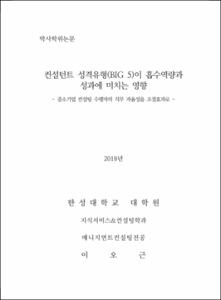컨설턴트 성격유형(BIG 5)이 흡수역량과성과에 미치는 영향
= The influence of the personality traits of the consultant on the absorptive capacity and performance : Focused on the Moderating Effects of job autonomy of consultants in SMEs' consulting
- Type
- Thesis
- Alternative Title
- 중소기업 컨설팅 수행자의 직무 자율성을 조절효과로
- Advisor
- 김정렬
- Department
- 대학원 지식서비스&컨설팅학과
- Issued Date
- 2018
- Publisher
- 한성대학교 대학원
- Keyword
- 성격유형(BIG 5); 흡수역량; 성과; 직무자율성
- Appears in Collections:
- 지식서비스&컨설팅학과 > 1. Thesis
- Files in This Item:
-
-
Download
 200000002422.pdf
기타 데이터 / 1.24 MB / Adobe PDF
200000002422.pdf
기타 데이터 / 1.24 MB / Adobe PDF
-
Items in Repository are protected by copyright, with all rights reserved, unless otherwise indicated.